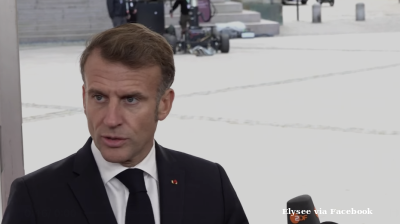Ukraine’s blitz inquiry into and dismissal of reports that Ukrainian rocket engines are driving North Korea’s developing nuclear programme are unlikely to convince many, as the Eastern European country’s defence sector remains a black market swamp.
A New York Times article of August 14 reported the international intelligence community’s concerns that “illicit networks” based in Ukraine had supplied North Korea with the engines that power its intercontinental ballistic missile that could apparently reach the US.
“It’s likely that these engines came from Ukraine – probably illicitly,” missile expert Michael Elleman of the UK’s International Institute for Strategic Studies told the NYT. “The big question is how many they have and whether the Ukrainians are helping them now. I’m very worried.”
On August 22, the head of Ukraine’s National Security and Defense Council, Oleksandr Turchinov, reported back to Ukrainian President Petro Poroshenko on an immediate inquiry that had been set up into the NYT’s allegations. The main finding of Turchinov’s report was that Ukraine’s “existing system of state export control over the international transfers of military and dual-use goods excludes the possibility of transferring such goods to the countries which are under respective sanctions imposed by the UN Security Council”.
But the NYT article was not the first time that Ukraine has been linked to breaches of the UN sanctions regimes on North Korea and Iran – the two countries closest to getting the bomb that are at loggerheads with the West. Indeed, Ukraine’s track record of such incidents since independence in 1991 makes Turchinov’s findings look like a whitewash.
Sanctions breach
As recently as 2013, the UN Sanctions Committee Panel of Experts pinpointed a group of Ukrainians, in partnership with Kazakhs, as having masterminded an attempt in 2009 to smuggle 35 tonnes of North Korean weaponry out to Iran in breach of sanctions. The attempt failed when Thai police raided the plane carrying the arms in Bangkok, sparking a major international scandal.
The key individuals identified by the UN investigators were Ukrainian national Iurii Lunov, manager at Ukrainian firm GST Ukraine, and his partner, Kazakh air cargo operator Aleksandr Zykov, owner of air cargo firm East Wing, formerly called GST Aero. The Panel of Experts recommended that they be placed under UN sanctions for their role. Lunov and Zykov denied involvement, claiming they were set up, but have so far failed to substantiate their arguments.
Ukraine has still conducted no investigation of its own into the activities of Lunov and GST Ukraine. GST Ukraine continues operating today, albeit under different management. None of this was even mentioned in Turchinov’s report.
But what is most scandalous is that Lunov’s GST Ukraine was and is registered at the very same address as Ukraine’s State Expert Control Service, the state body tasked with combating arms trafficking: vul Frunze 19-21 in Kyiv (recently renamed as vul Kirilivska). This makes Turchinov’s claim that the existing system of state export controls precludes such illicit transfers dangerously wrong.
When this correspondent gatecrashed the GST Ukraine office in the autum of 2014, I saw folders bearing the name Yushmash Avia – the air cargo division of state-owned rocket engine builder Pivdenmash (Yushmash in Russian), which the NYT pointed to as the most likely source of North Korea’s engines.
This casts doubt on Turchinov’s claims that Ukraine’s export control service prevents any breaches of sanctions. Instead, it raises the possibility that organized crime interests long present in Ukraine’s state arms trading sector are actively scheming to breach international sanctions.
Address to depress
That North Korea acquired its latest and most successful rocket engines from Ukraine remains a matter of conjecture. But there is a track record since Ukrainian independence of sanctions-busting behaviour relating to both North Korea and Iran that makes it too large a risk to ignore. And a lot of this sanctions-busting activity was based at the address of Ukraine’s State Export Control Service – the body tasked with combating the country’s arms trafficking.
Thus, Lunov in the late 1990s ran a firm called Antonov-Aerotrack Aviaservis. Antonov-Aerotrack Aviaservis was registered at the same address, and even with the same telephone number, as GST Ukraine has today, ie. the same address as the State Export Control Service.
Lunov’s 1990s firm was a subsidiary of Antonov Aerotrack Aviation, a controversial cargo flier partly owned by Ukrainian state defence and aviation firms. The rest was owned by alleged organised crime interests, including the notorious Austrian firm Nordex, run by controversial businessman Grigory Louchansky. “The CIA reported that it [Nordex] deals in various schemes from illegal arms trading to money laundering for the Russian mob,” the US Embassy in Kyiv wrote in a Crime Digest circular from April 1999.
In 1996, CIA sources told Time magazine that in 1995 Nordex had flown Scud missile launcher parts from North Korea to Iran, using a Ukrainian-registered Antonov Aerotrack plane, via Kyiv. CIA sources also told Time that Nordex had transferred nuclear materials to Iran in 1993-94.
In 2001, the sanctions-busting network apparently struck again: Kazakh cargo flyer GST Aero allegedly smuggled a Ukrainian X-55 ‘Kent’ nuclear-capable cruise missile out of Ukraine to Iran. The facts were established by a later investigation by Ukraine’s parliamentary organised crime committee, and an associated criminal investigation leading to charges. GST Aero was renamed East Wing before its involvement in the 2009 attempt to smuggle 35 tonnes of North Korean weaponry out to Iran in breach of sanctions.
None of this means that this network transferred Pivdenmash rocket engines to North Korea. But it does mean that an infrastructure is in place in Ukraine that could do so – and it is located at the very heart of Ukraine’s system of export controls. This is what Turchinov should have been investigating instead of conducting what looks like a whitewash.


